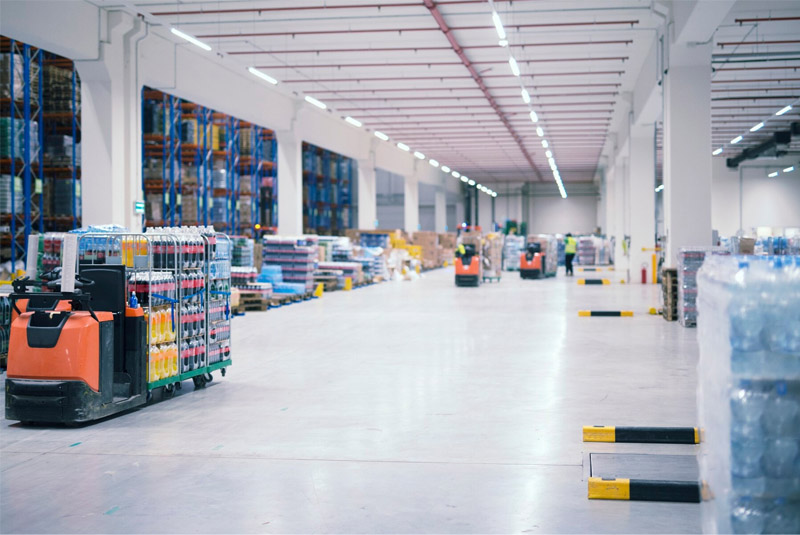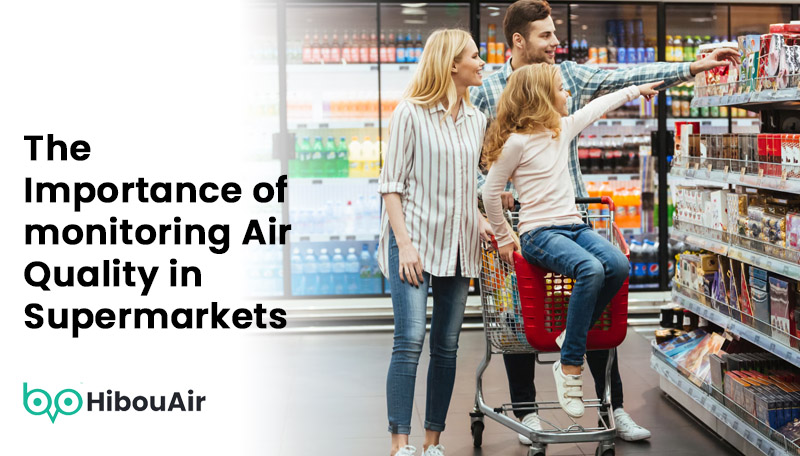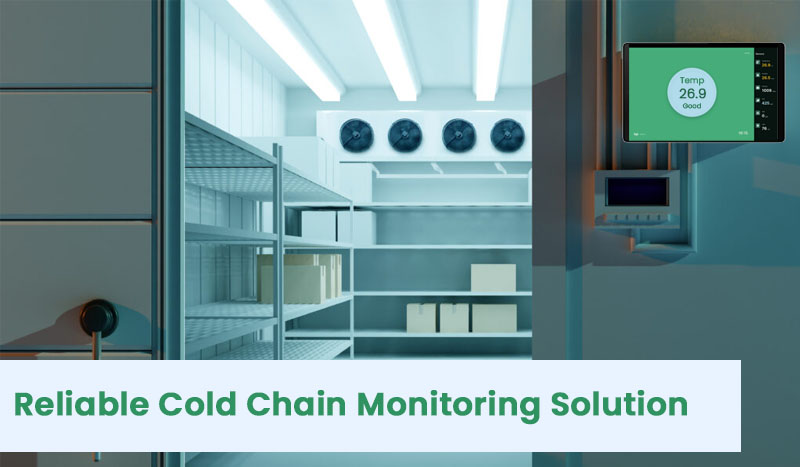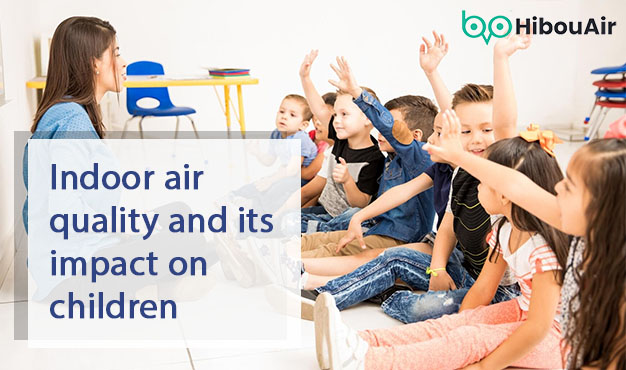Air quality plays a crucial role in maintaining the health and comfort of occupants in any indoor environment. In supermarkets and warehouses, where large numbers of people work and shop, maintaining optimal air quality is essential. These environments often have high foot traffic, extensive product handling, and the use of various machinery, all of which can contribute to poor indoor air quality if not properly managed. HibouAir, with its advanced real-time and historical air quality monitoring capabilities, offers a comprehensive solution to address these challenges.
Challenges of Air Conditioning in Large Spaces
Supermarkets and warehouses are typically vast spaces, often with high ceilings and large open areas. These characteristics pose significant challenges for maintaining consistent air conditioning and ventilation. The large volume of air requires powerful HVAC systems, which can be difficult to regulate effectively. Temperature stratification, where the air temperature varies significantly at different heights, can lead to discomfort and uneven cooling or heating. Additionally, these spaces often have multiple entry and exit points, causing fluctuations in air quality as external pollutants enter the building.
The Importance of Monitoring Air Quality
Monitoring air quality in supermarkets and warehouses is vital for several reasons:
- Health and Safety: Poor air quality can lead to health issues for employees and customers, including respiratory problems, allergies, and other illnesses.
- Product Integrity: Many products, especially perishable goods, are sensitive to temperature, humidity, and air quality. Proper monitoring ensures these products remain in optimal condition.
- Regulatory Compliance: Adhering to air quality standards is necessary to meet health and safety regulations.
- Energy Efficiency: Monitoring allows for the optimization of HVAC systems, leading to significant energy savings.
How to Maintain Indoor Air Quality in Supermarkets
Maintaining good indoor air quality in supermarkets involves several strategies, leveraging advanced technology to ensure a healthy and comfortable environment for both customers and employees. Here are some key approaches:
- Regular HVAC Maintenance: Ensuring that HVAC systems are regularly maintained and cleaned to prevent the buildup of dust and other pollutants is essential. Continuous monitoring of air quality parameters such as particulate matter (PM), CO2, and volatile organic compounds (VOCs) can help identify when maintenance is needed, preventing issues before they become significant problems.
- Proper Ventilation: Implementing effective ventilation systems that provide a steady supply of fresh air while removing stale air and contaminants is crucial. Air quality monitoring sensors can track CO2 levels, temperature, humidity, and pressure, providing real-time data to adjust ventilation rates based on occupancy and environmental conditions. This helps maintain optimal air quality and energy efficiency.
- Advanced Monitoring and Integration: Utilizing comprehensive air quality monitoring systems that include sensors for CO2, PM1.0, PM2.5, PM10, VOCs, pressure, temperature, and humidity offers a holistic view of indoor air quality. These systems can easily integrate with existing HVAC and ventilation systems, enabling automated adjustments based on real-time data.
- Bluetooth Technology and Smart Analytics: Modern air quality monitoring devices often feature Bluetooth technology, allowing for seamless communication and data transfer. Coupled with a smart analytical dashboard, desktop application, and mobile application, these systems provide easy access to air quality data and insights, helping managers make informed decisions about maintaining and improving air quality.
- Real-Time and Weekly Alerts: Air quality monitoring systems that provide real-time alerts and weekly reports can help quickly address any air quality issues. Real-time alerts notify managers immediately when air quality parameters exceed safe levels, while weekly reports provide an overview of trends and potential areas for improvement.
- Virus Index and Occupancy Reports: Some advanced monitoring systems offer a virus index, which assesses the risk of airborne virus transmission based on air quality parameters. Additionally, occupancy reports can help manage ventilation and air conditioning systems more effectively by adjusting settings based on the number of people in the space, ensuring both comfort and energy efficiency.

Temperature Control by Monitoring
Effective temperature control in supermarkets and warehouses is essential for both product preservation and occupant comfort. HibouAir’s temperature sensors provide real-time data, enabling precise temperature regulation. This prevents hot and cold spots within the space, ensuring a uniform and comfortable environment. Moreover, maintaining the correct temperature is critical for food safety and prolonging the shelf life of perishable items.
Energy Consumption by Integrating HibouAir with Ventilation
Integrating HibouAir with existing ventilation systems can significantly reduce energy consumption. By continuously monitoring air quality parameters such as CO2 levels, temperature, humidity, and particulate matter, HibouAir can provide actionable insights to optimize HVAC operations. For instance, adjusting ventilation rates based on occupancy and real-time air quality data can lead to substantial energy savings.
HibouAir Solutions to Save Energy and Improve Comfort
HibouAir offers several solutions to improve air quality, save energy, and enhance comfort in supermarkets and warehouses:
- Real-Time Monitoring: Continuous monitoring of air quality parameters allows for immediate responses to any issues, ensuring a consistently healthy environment.
- Smart Analytics Dashboard: HibouAir’s dashboard provides valuable insights and trends, helping managers make informed decisions about HVAC operations and maintenance.
- Automated Control: Integrating HibouAir with building management systems enables automated adjustments to ventilation and air conditioning based on real-time data, optimizing energy use and maintaining optimal air quality.
- Comprehensive Sensor Suite: With sensors for CO2, PM1.0, PM2.5, PM10, pressure, temperature, humidity, and VOCs, HibouAir provides a holistic view of the indoor environment, ensuring all aspects of air quality are addressed.
Maintaining good air quality in supermarkets and warehouses is essential for health, safety, and operational efficiency. HibouAir provides a robust solution for monitoring and managing air quality, ensuring a comfortable and safe environment while optimizing energy use. By integrating HibouAir into their ventilation systems, supermarket and warehouse managers can achieve significant improvements in air quality, energy savings, and overall comfort.



